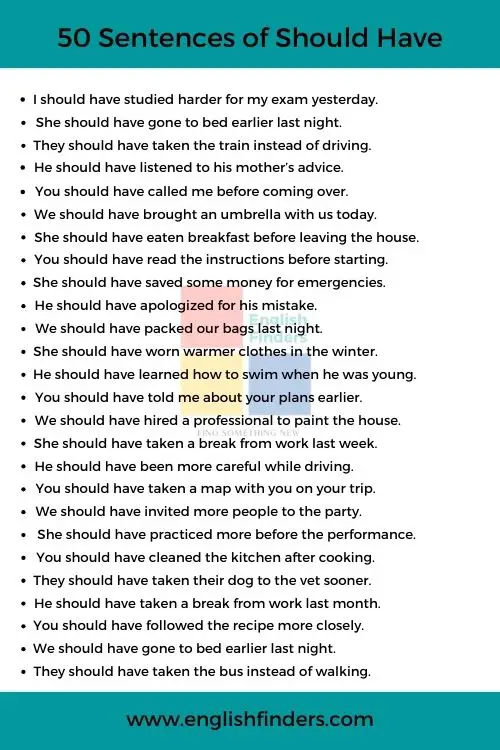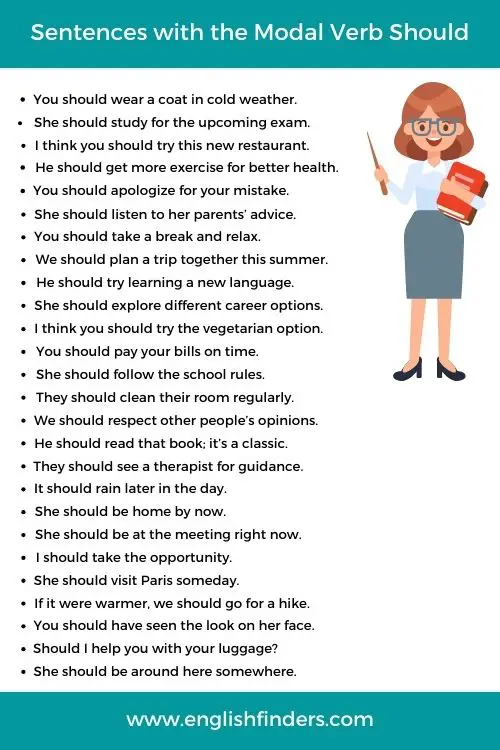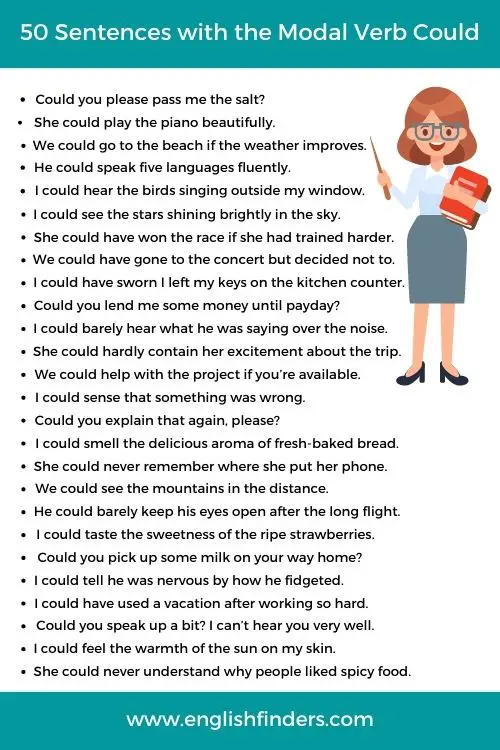Last updated on September 16th, 2023 at 11:56 pm
Understanding and correctly using modal verbs is essential for effective communication in English. Among these, the modal verb “may” holds significant importance. In this article, we’ll explore 100 sentences demonstrating how “may” can be used in different contexts, helping you grasp its nuances and improve your language skills.
Don’t worry if you’re new to the world of modal verbs – we’ll start with the basics and gradually level up as we progress. Whether you’re a beginner or an intermediate learner, our goal is to make this learning experience informative and enjoyable.
100 Sentences with the Modal Verb May with Explanations
Quick Navigation
Let’s explore the 100 useful sentences with the modal verb may with their explanations.
Getting Started with “May”: The Basics
- I may go to the party tonight.
- May I borrow your pen, please?
- She may not have received the memo.
- May we discuss this matter further?
“May” is often used to talk about possibility or permission. In the first two sentences, we see “may” expressing the possibility of an action happening, while in the next two, it’s used to ask for permission. It’s a simple yet powerful way to add flavor to your conversations.
Expressing Uncertainty
- The weather may be rainy tomorrow.
- He may or may not join us for lunch.
- I may have left my keys at home.
- They may decide to postpone the meeting.
When you’re unsure about something, “may” is your go-to word. It conveys that things are not set in stone and leaves room for different outcomes. So, go ahead and sprinkle a little “may” when you’re discussing uncertain situations.
Suggesting and Advising
- You may want to double-check your calculations.
- We may consider taking a different route.
- May I suggest a movie for tonight?
- She may find that book interesting.
“May” also has a persuasive side. When you want to suggest ideas or offer advice in a polite manner, it’s your best friend. It’s like saying, “Hey, here’s something to think about.”
Imagining and Dreaming
- In the future, robots may do all our household chores.
- One day, we may travel to distant galaxies.
- She may become a famous artist someday.
- The recipe may taste even better with a dash of spice.
“May” isn’t just about the present – it’s a time traveler! It takes you into the realms of imagination and future possibilities. So, unleash your creativity and let “may” transport you to exciting worlds.
Adding Politeness and Formality
- May I inquire about the available job positions?
- You may want to consider their proposal seriously.
- May I express my gratitude for your assistance?
- He may be running a bit late due to traffic.
When you want to be courteous or formal, “may” is your etiquette guide. It’s like putting on your best manners and extending a polite invitation into your conversation.
Forming Conditional Sentences
- If it rains, we may have to cancel the picnic.
- She may join us if she finishes her work in time.
- You may pass the exam if you study diligently.
- If they hurry, they may catch the last train.
“May” can also team up with conditional statements to paint scenarios with different outcomes. It’s like sketching “what if” scenarios and exploring the results.
Expressing Hope and Wishes
- May your dreams come true.
- May the new year bring you happiness.
- May you have a wonderful day ahead.
- I hope you may find the answers you seek.
When you want to shower your hopes and wishes upon someone, “may” is your messenger of goodwill. It’s like wrapping positive vibes in linguistic elegance.
Offering Concessions
- I may not be an expert, but I can help.
- He may have his quirks, but he’s a good person.
- It may take time, but you’ll eventually get there.
- She may be strict, yet she’s fair.
“May” can also show flexibility and willingness to acknowledge contrasting points. It’s like saying, “Sure, there are some points to consider, but let’s not overlook the positive side.”
Describing Possibility in the Past
- She may have forgotten her umbrella at the café.
- They may have visited that museum last summer.
- He may not have realized what he said.
“May” isn’t just for the present and future; it also plays well with the past. It helps you speculate about events that might have happened earlier.
Indicating Likelihood
- The concert may be sold out by now.
- She may not be able to attend the meeting.
- They may have already left for the airport.
- You may find the information in the last chapter.
“May” is like your detective partner when you’re assessing probabilities. It helps you make educated guesses based on the information available.
Softening Statements
- That may not be entirely accurate.
- She may not completely understand the situation.
- He may not fully agree with your proposal.
When you want to express reservations or disagreements in a gentle manner, “may” comes to the rescue. It’s your cushion of diplomacy.
Asking for and Giving Permission
- May I use your phone for a moment?
- You may go ahead and start without me.
- May they enter the premises?
Permission-seeking is where “may” really shines. It’s like a polite knock on the door before entering someone else’s linguistic space.
Talking About Rules and Regulations
- You may not smoke in this area.
- Students may not leave the campus during breaks.
- Employees may be required to attend the workshop.
“May” takes on a serious tone when it comes to rules and regulations. It’s like the voice of authority, politely stating what’s allowed and what’s not.
Expressing Preferences
- I may prefer chocolate over vanilla.
- She may enjoy swimming more than hiking.
- He may opt for the vegetarian option.
When you’re discussing personal likes and dislikes, “may” lets you share your preferences without sounding too forceful.
Discussing Future Plans
- They may travel to Europe next summer.
- I may take up a new hobby soon.
- She may start her own business down the line.
“May” is your time traveler again! It helps you discuss your future plans and aspirations with a dash of uncertainty and excitement.
Talking About Abilities and Skills
- With practice, you may become an excellent pianist.
- She may have the ability to solve complex problems.
- They may possess exceptional communication skills.
“May” unveils hidden talents and capabilities. It’s like unveiling a curtain of potential and showcasing what’s possible.
Discussing Academic and Professional Goals
- He may pursue a degree in engineering.
- She may aim for a leadership position.
- They may work towards becoming experts in their field.
When you’re diving into academic or career discussions, “may” helps you sketch out future goals with optimism.
Sharing Medical and Health Information
- He may need to take antibiotics for a week.
- You may experience some discomfort after the procedure.
- She may need to follow a specific diet.
“May” enters the realm of health, offering suggestions and insights for possible outcomes.
Expressing Conditional Wishes
- May you find happiness wherever you go.
- May you succeed in all your endeavors.
- May your journey be filled with joy and laughter.
“May” takes on a poetic tone, expressing heartfelt wishes for others’ happiness and success.
Exploring Unlikely Scenarios
- The moon may turn blue tonight.
- It may rain elephants tomorrow.
- I may win the lottery one day.
“May” also has a playful side! It’s like taking a trip to the land of imagination, where the unexpected becomes possible.
Offering Explanations
- She may be late due to heavy traffic.
- The cake may not have risen because of the oven temperature.
- He may not have received the email yet.
When you’re providing reasons for certain outcomes, “may” adds a touch of speculation to your explanations.
Expressing Surprise
- You may not believe what happened next!
- She may have solved the puzzle in record time.
- He may have won the talent show with his performance.
“May” fuels the element of surprise in your storytelling. It’s like unveiling a plot twist that’s beyond imagination.
Discussing Economic Possibilities
- The stock prices may rise by the end of the week.
- The company’s profits may decline due to increased competition.
- They may invest in renewable energy technologies.
When the talk turns to money and finance, “may” helps you predict possible economic scenarios.
Talking About Personal Predictions
- I may not be an expert, but I think she’ll win.
- He may have a tough time in the final exam.
- They may not like the new changes to the system.
“May” lets you share your personal predictions with a sprinkle of uncertainty.
Exploring Cultural Practices
- In some cultures, people may bow as a sign of respect.
- They may celebrate the harvest festival with traditional dances.
- She may wear a certain color to signify mourning.
“May” delves into cultural practices and traditions, shedding light on different ways of life.
Discussing Environmental Possibilities
- In the future, cars may run on alternative fuels.
- We may see more electric vehicles on the roads.
- Renewable energy sources may replace fossil fuels.
When it’s time to talk about the environment, “may” opens doors to possibilities for a greener future.
Talking About Technological Advancements
- In the coming years, smartphones may become even smarter.
- Robots may perform tasks currently done by humans.
- We may witness groundbreaking innovations in medicine.
“May” propels us into the future, where technological wonders await at every turn.
Exploring Literary Scenarios
- In the mystery novel, the detective may uncover a shocking truth.
- The protagonist may overcome all obstacles to achieve success.
- The plot may take unexpected twists and turns.
“May” is a favorite of storytellers, adding an element of anticipation to literary discussions.
Reflecting on Historical Possibilities
- During ancient times, civilizations may have communicated through symbols.
- Historical figures may have faced challenges we can’t fully comprehend.
- Certain events may have shaped the course of history.
“May” takes us back in time, allowing us to speculate about the past through an imaginative lens.
Reflecting on Personal Growth
- Through challenges, we may develop resilience.
- She may learn valuable life lessons from her experiences.
- We may become better versions of ourselves over time.
“May” serves as a guide on your journey of personal growth, highlighting the potential for positive change.
Expressing Social Observations
- In today’s interconnected world, people may form friendships online.
Final Thoughts
The modal verb “may” is a versatile tool in the English language, offering various ways to express permission, possibility, requests, and more. Mastering its usage will enhance your communication skills and convey your thoughts effectively.

Azizul Hakim is the founder & CEO of englishfinders.com. He is a passionate writer, English instructor, and content creator. He has completed his graduation and post-graduation in English language and literature.




